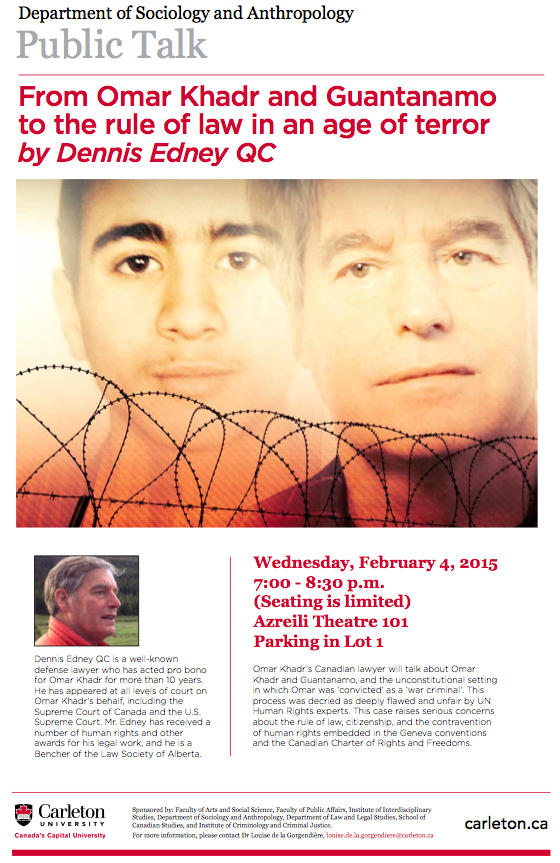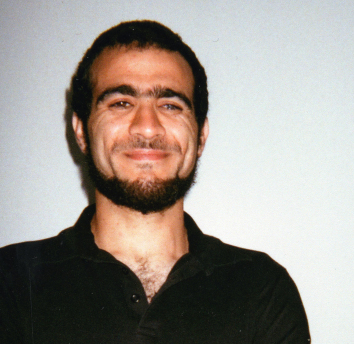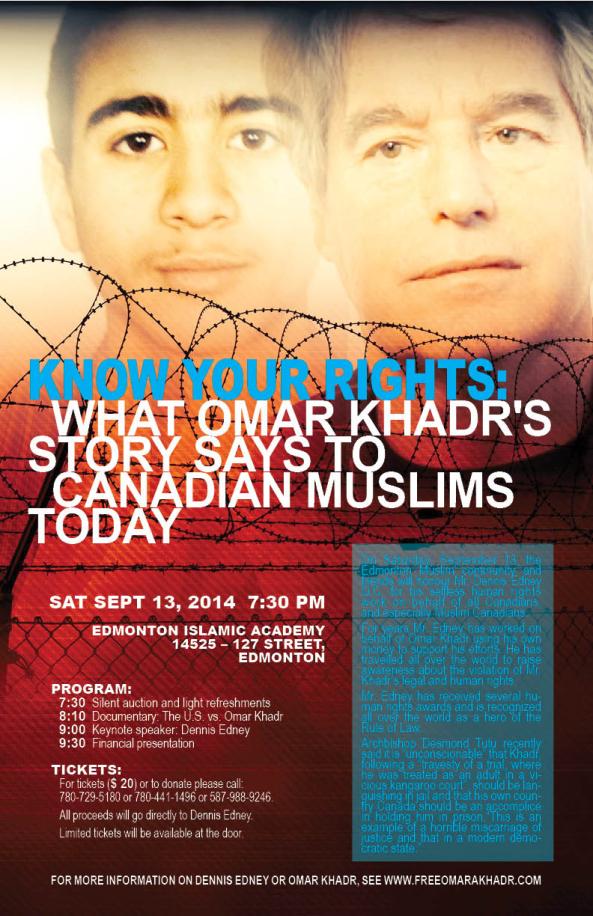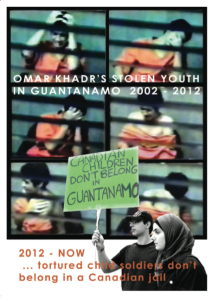By Aisha Maniar, Truthout | July 26, 2020
On July 27, 2002, 15-year old Canadian Omar Khadr was captured by the United States following a battle between American soldiers and local militias in Afghanistan. He was shot in the back by the soldier who found him unconscious, unarmed and face down near the compound where he was staying.
Khadr survived and was taken to the Bagram Airbase where he was held for three months, during which he was threatened with rape and other forms of physical and psychological abuse, including waterboarding. Torture evidence obtained from a child and a doctored field report would later be used to implicate Khadr in the death of a US Special Forces soldier in that battle.
He was taken to Guantánamo Bay in October 2002, where his torture continued. First charged with war crimes in 2005, Khadr’s 2010 military tribunal was unique for two reasons: It was the first one under Obama and his revised Military Commissions Act, and, more importantly, he is the only person to have been tried by military tribunal since World War II for war crimes allegedly committed as a minor.
Up against a kangaroo court and the prospect of at least a life sentence, Khadr later admitted that he agreed to plead guilty to all the charges against him in a secret plea bargain in October 2010 as it was his only way out of Guantánamo. Under the deal, Khadr was to serve one more year at Guantánamo and the remainder of his sentence - seven years - in Canada. Throughout his US incarceration, he was never once treated as a minor or a child soldier, but as an “enemy combatant.”
The Canadian government, having been found in 2010 by the Canadian Supreme Court to have acted in breach of its own human rights obligations in its treatment of Khadr, put up stiff resistance to his release, which took place almost a year later than anticipated in September 2012. A minimum security-risk prisoner at Guantánamo, he was promptly imprisoned at a maximum security facility. This risk was only downgraded by the prison board in December 2013, and he was moved to a medium-security prison in February 2014. During that period, and since his conviction, he spent almost all of his time in solitary confinement. Over the past few months, for the first time, Khadr has had access to rehabilitation and counseling.
Undeterred, Omar Khadr has been making up for lost time since his return to Canada, and then some. At Guantánamo Bay, many basic things were out of his reach, including justice. Khadr has brought court cases pending against both the United States and Canada. Over the past year, since reappointing Dennis Edney, who represented him at Guantánamo, Khadr’s quest for justice has rapidly accelerated.
Canada, on the other hand, given its abuses of him, has opted for trial by media, with Canadian politicians and journalists, none of whom have ever met Khadr, demonizing him in the public imagination. Since his return to Canada, he has more or less been completely forgotten elsewhere.
Nearly 11 years in the making, on September 23, 2013, Omar Khadr had his first real day in court when he appeared before an Edmonton court for consideration about whether he should be moved to a provincial prison to serve his sentence as a youth offender. Khadr lost that particular case. Nonetheless, it was a first public appearance and the first time he saw his supporters, who packed out the courtroom. For them, Khadr was nothing like the image portrayed by journalists who had never met him.
On appeal, appeal, on July 8, 2020, the decision was reversed in a clear judgment that stated under Canadian law the sentence could only have been a youth sentence, given his age at the time. Nonetheless, he remains where he is for now, having agreed to a stay of the decision pending an appeal by the Canadian government to the Canadian Supreme Court.
This judgment came just days after the first of two important pieces of recent news concerning Khadr’s appeal against his military commission conviction in the United States. On June 30, 2014, following the release of a secret memo that shows that the United States deliberately designated Khadr an “unprivileged belligerent” to charge him with offenses it knew did not exist under domestic or international law, Khadr’s lawyers filed a motion to have the conviction vacated. Following a counter-motion by the US government, this was dismissed.
Khadr’s appeal, filed in 2013, was stayed in March 2014 pending a decision in the retrial of an appeal by another Guantánamo prisoner, Yemeni Ali Hamza Al-Bahlul. Convicted on some similar charges to Khadr, a confusing judgment was handed down on July 14, 2014. The impact this will have on Khadr’s own appeal remains unclear, but it is likely that Khadr will have to continue to wait.
Meanwhile, in Canada, in December 2013, Khadr’s lawyers brought a second case before the courts, suing the Canadian government for damages for violations of his human rights at Bagram and Guantánamo, as well as conspiring with the United States in the violation of Canadian and international laws. This case is expected to be heard at some point in 2014.
Having abused his legal rights for over a decade, justice is not tipped in the balance of either the US or Canada. Consequently, the only case that received worldwide media attention was an application filed by the wife of the man Khadr is alleged to have killed and the soldier he is alleged to have injured suing him for damages of over $45 million in a Utah court. The case has yet to even be admitted.
Now aged 27, Omar Khadr has spent almost half his life behind bars for a crime no concrete evidence has substantiated. Unlike government lawyers, he is constantly looking forward rather than back, and it is not just in the courts Khadr has something to look forward to. For those who believe media claims that Guantánamo has superb medical facilities, it was only in March this year that Khadr received surgery to his shoulder, injured when he was shot in that fateful battle 12 years ago. Blinded in one eye that day, he has yet to receive treatment to the other eye, in which shrapnel remains lodged.
Khadr’s main concern right now is a basic right most Americans and Canadians take for granted; having been held as an adult, Khadr was never given an opportunity to study. He is currently working hard to get his high school diploma. His lawyer told me: “Omar has no bitterness; he has nothing but forgiveness.”
This view was seconded by Archbishop Desmond Tutu, who called Khadr during a visit to Canada earlier this year. Regarding their conversation, he said he was “pleasantly surprised at how calm and un-bitter” Khadr sounded. “We just exchanged pleasantries. But he really impressed me in that short conversation as a gentle and sensitive person.”
It is unclear how long the United States and Canada intend to keep selling the myth of Omar Khadr as an unrepentant war criminal without any substantive evidence, but they must realize that the end game has begun and is picking up pace. Omar Khadr will never get back what he has lost, but the opportunity to tell his side of the story, denied to him for so long, is a huge step in the right direction.
Copyright, Truthout.
Link to Truthout article: http://truth-out.org/opinion/item/25161-the-trials-of-alleged-tween-terrorist-omar-khadr-of-canada
Like this:
Like Loading...
 Dennis Edney, lawyer for Omar Khadr for more than 10 years, will give a lecture at Carleton University on Feb. 4, 2015 called From Omar Khadr and Guantanamo to the Rule of Law in an Age of Terror.
Dennis Edney, lawyer for Omar Khadr for more than 10 years, will give a lecture at Carleton University on Feb. 4, 2015 called From Omar Khadr and Guantanamo to the Rule of Law in an Age of Terror.


